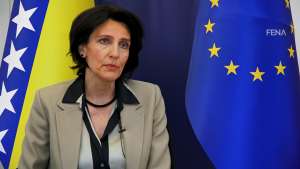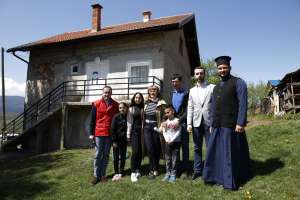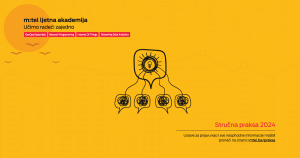SARAJEVO, March 30 (FENA) - The European Union is facing difficult challenges today, questioning Europe's cohesion because after the pandemic emerges, each member state sets its own measures, ranging from restricting exports of medical equipment to milder or stricter border controls, Secretary-General of the Pan-European Union in Bosnia and Herzegovina Haris Ćutahija said in an interview for FENA.
According to him, the institutions of the European Union are lagging behind the Member States in determining measures to combat coronavirus and in coordinating the measures they determine, which in itself confirms that the European Union was not quite ready for such a catastrophe. However, it is on a good way to change this. The European Union's response will be based on four priorities: limiting the spread of the virus, securing medical supplies, encouraging the search for vaccines and supporting the economy.
He stresses that there is also discontent in the Western Balkan countries with the weak reaction of the European Union, primarily the restriction of exports of medical equipment. According to some leaders in the region, these countries are left alone. President of the Republic of Serbia, Aleksandar Vučić, went so far and said that European solidarity does not exist, that it is a fairy tale on paper. However, Ambassador Johann Sattler, Head of the Delegation of the European Union to BiH, denied such statements with the announcement of immediate assistance of seven million euros to Bosnia and Herzegovina for health and assistance for economic consequences of pandemic of up to 50 million euros.
“EU then denied Vučić’s statements with the decision to allocate even more, 93.4 million euros to help Serbia. This has shown the European Union to be friends with Bosnia and Herzegovina and the Western Balkans even in difficult times,” says Ćutahija.
If we think a little longer, he adds, the question is what happens after panedemic.
“The pandemic will have far-reaching consequences, the worst of which, after the deaths, will be the economic ones. The EU will certainly work to better integrate health after the pandemic, but the question is what will the Western Balkan countries do? The drastic nature of restrictive measures shows the fact that there are many people who do not have problem with imposing these measures, there are even those who will benefit of it, and there is a real danger of holding these measures for longer than necessary when pandemic passes. On the other hand, the EU enlargement process has not stopped despite the pandemic, even though it is the most important topic everywhere. North Macedonia and Albania are very close to opening negotiations for EU membership, and other countries in the region that are in different stages of accession are still working to meet the conditions, as far as the current situation allows. The European Union persistently reaffirms BiH's European perspective, but we should also know that the accession process is more rigorous and inclusive today than before. This means that we must take reforms much more seriously and responsibly, and that accession to the European Union, as our main foreign policy priority, must never fall into the background,” concluded Ćutahija.
(FENA) A. B.











